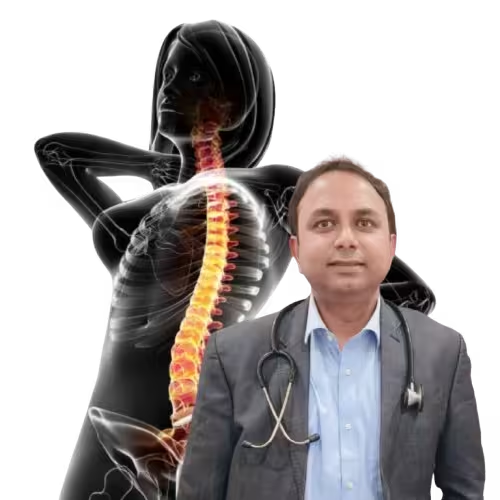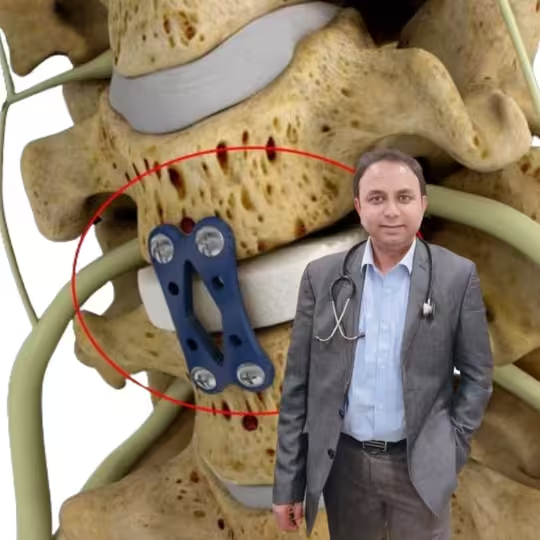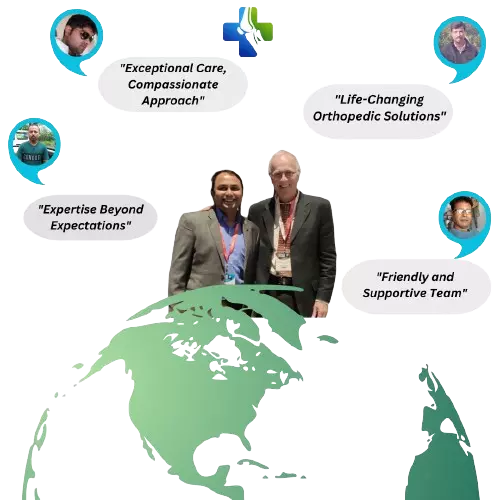Spinal Fusion Treatment in Kolkata by Dr. Gautam Gupta
Spinal Fusion Treatment
Spinal Fusion is a surgical procedure designed to eliminate motion between two or more vertebrae in the spine, providing stability and reducing pain. This treatment is often recommended for individuals suffering from conditions such as degenerative disc disease, spinal stenosis, spondylolisthesis, or after spinal trauma.
- Chronic Back Pain: Persistent pain due to degenerative conditions that have not responded to conservative treatments.
- Spinal Instability: Conditions like spondylolisthesis, where one vertebra slips over another, leading to instability and pain.
- Herniated Discs: When a disc bulges or herniates, causing nerve compression and significant pain.
- Spinal Deformities: Such as scoliosis, which may require surgical intervention to correct curvature and stabilize the spine.

What is Spinal Fusion?
Spinal fusion involves the use of bone grafts and hardware, such as screws and rods, to fuse adjacent vertebrae together. By eliminating movement between the vertebrae, the procedure aims to.
01
Definition:
Spinal fusion is a surgical procedure that permanently connects two or more vertebrae in the spine to eliminate motion between them.
02
Purpose:
The primary goal of spinal fusion is to stabilize the spine, alleviate pain, and restore function in patients suffering from various spinal conditions.
03
Common Conditions Treated:
Degenerative disc disease Herniated discs Spinal stenosis Spondylolisthesis Spinal deformities (e.g., scoliosis)
04
Procedure Overview:
Involves the placement of bone grafts between the vertebrae to promote healing and fusion. May use metal implants such as screws, rods, or plates for added stability during recovery.

Why Choose Spinal Fusion Treatment in Kolkata?

Kolkata offers a range of specialized healthcare facilities and experienced orthopedic surgeons proficient in spinal surgeries, including spinal fusion. Choosing a skilled surgeon ensures that patients receive the highest quality care and optimal outcomes.

Surgeon's Experience and Expertise:
Choose a surgeon with specialized training and extensive experience in performing spinal fusion surgeries. Reviewing their credentials and success rates can provide insights into their proficiency.

Type of Spinal Fusion:
Understand the different types of spinal fusion (e.g., anterior, posterior, minimally invasive) and which approach is most suitable for your condition. Discuss with your surgeon to determine the best technique for your specific needs.

Pre-Operative Assessment:
A thorough pre-operative evaluation is crucial to assess your overall health and suitability for surgery. This may include imaging studies, physical exams, and discussions about your medical history and any underlying health issues.

Potential Risks and Complications:
Be aware of the risks associated with spinal fusion, including infection, nerve damage, and complications related to anesthesia. Discuss these risks with your surgeon to make an informed decision.

Recovery Time and Rehabilitation:
Understand the expected recovery timeline and any rehabilitation requirements post-surgery. Consider how the recovery process may affect your daily activities, work, and lifestyle.

Long-Term Outcomes and Goals:
Discuss the expected outcomes of spinal fusion with your surgeon, including potential pain relief, improved functionality, and how the procedure may impact your quality of life in the long term.
Frequently Asked Questions About Spinal Fusion Treatment
Spinal fusion is a surgical procedure that permanently connects two or more vertebrae in the spine to stabilize the spine and alleviate pain.
It is typically recommended for conditions like degenerative disc disease, herniated discs, spinal stenosis, and spondylolisthesis that cause chronic pain or instability.
The procedure involves making an incision, removing damaged tissue, placing bone grafts, and securing the vertebrae with metal implants like screws and rods.
The surgery usually takes between 2 to 6 hours, depending on the complexity of the case and the number of vertebrae being fused.
General anesthesia is typically used, ensuring the patient is unconscious and pain-free during the procedure.
Initial recovery may take a few weeks, but complete healing and return to normal activities can take several months.
Some pain and discomfort are expected post-surgery, but pain management strategies will be implemented to help ease this.
The hospital stay usually lasts between 1 to 3 days, depending on the individual’s recovery progress.
The return to work will depend on the nature of your job; many patients can return to light work within a few weeks, while more physically demanding jobs may require a longer absence.
Risks include infection, bleeding, nerve damage, blood clots, and complications related to anesthesia, as well as the potential for incomplete pain relief.
Preparation includes following your surgeon’s instructions, stopping certain medications, and arranging for post-operative transportation and care.
As with any surgical procedure, risks include infection, bleeding, lead migration, and in rare cases, nerve damage or inadequate pain relief.
During the trial phase, patients will assess their pain relief. If significant improvement is reported, the device is likely to be effective.
Many patients can return to light work within a week, but full return to normal activities may take longer depending on the individual’s healing process.
Many health insurance plans cover spinal cord stimulation when it’s deemed medically necessary, but it’s essential to check with your insurance provider for specific coverage details.
Many health insurance plans cover reconstructive surgery, especially when it’s deemed medically necessary. It’s advisable to check with your insurance provider for specific coverage details.
Spinal cord stimulators are primarily used in adults, but in certain cases, adolescents may be candidates for the procedure after thorough evaluation.
Costs can vary widely based on the facility, surgeon’s fees, and whether insurance covers part of the expense. It’s important to discuss costs with your healthcare provider.
The safety of spinal cord stimulators during pregnancy has not been extensively studied. It’s crucial to discuss this with your doctor if you’re pregnant or planning to become pregnant.
Seek recommendations from healthcare professionals, check for board certification and experience, and read patient reviews to find a qualified surgeon specializing in spinal cord stimulation.
Contact Us for Spinal Fusion in Kolkata
If you are experiencing chronic back pain or spinal instability and are considering spinal fusion treatment, our dedicated team is here to help you. Led by Dr. Gautam Gupta, a highly experienced orthopedic surgeon specializing in spinal surgeries, we are committed to providing personalized care and comprehensive support throughout your treatment journey.








